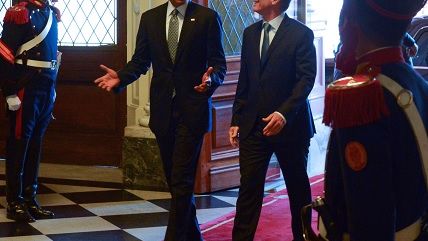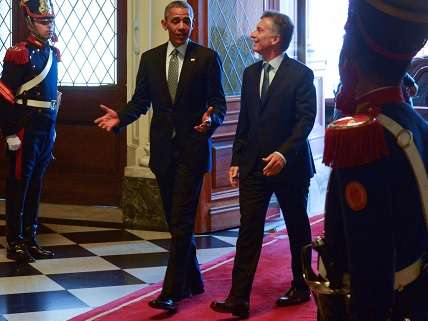Obama Denounces U.S. Support of Dictatorship Forty Years Ago
What about today?


President Obama continues his trip to Latin America with a visit to Argentina, where he remarked on U.S. support for the regime that replaced Isabel Peron after a coup 40 years ago.
Obama stopped short of apologizing for U.S. support for the military junta, but did say the U.S. was too slow in speaking out about human rights.
"There has been controversy about the policies of the United States early in those dark days," Obama said at a memorial for some of the victims of that regime. "Democracies have to have the courage to acknowledge when we don't live up to the ideals that we stand for. And we've been slow to speak out for human rights and that was the case here."
Obama's ease in sort-of-condemning U.S. foreign policies of nearly half a century ago fits into a broader pattern of foreign policy introspection displayed by the left recently: Note the misguided nature of a specific foreign policy from a bygone era, but draw no conclusions from them about the present day.
Yes, the United States had a history of ignoring human rights violations perpetrated by its allies, particularly during the Cold War. But it's also doing so today. Regimes like Saudi Arabia rely heavily on lucrative arms deals from the United States. Will some future president go there one day and sort-of-but-not-really apologize for U.S. support for the murderous House of Saud regime when it's finally, inevitably, overthrown? Or will U.S. support for the Saudi regime mean that we've helped destroy the room for democratic opposition and opened the door for it to be replaced by an equally or even more brutal one?
And what about the human rights violations the U.S. enabled with policies like its 2011 intervention in Libya? It'll have to be left for future generations to express regret about—for now the Libya legacy, such as it is in the U.S., is a potential political liability for the Obama administration and Hillary Clinton, the former cabinet member running for president, so don't expect any introspection.
Sanders does something similar when he talks about the "unintended consequences" of past U.S. foreign policy. The critique, already limited to the domain of foreign policy, is also limited to the past. At the same debate where Sanders warned about unintended consequences, he endorsed a more aggressive stance against Russia as well as Iran (even though he supported the Iran nuclear deal), and the idea that the U.S. should be a major force backing Muslim troops on the ground in their anti-ISIS campaign.
On Tuesday night Sanders appeared on Jimmy Kimmel Live. The late night talk show host asked Sanders if he was ready to "drop a bomb on a house that might contain innocent people" because "when you're fighting terrorism that happens." Sanders agreed.
"It does," he told Kimmel before insisting that he would use the military "in an effective and appropriate way, and that's what a president does." He mentioned his 2002 vote against the Iraq war, talked about the threat of unintended consequences there, and finished by saying that "there are times when you do have to use force, and I would certainly be prepared to do that."
Absent was any reflection on the so-called "collateral damage" of the war on terror that Kimmel referred to, the thousands of innocent people who are killed, and the unintended consequences of waging something like a drone war, where many targets aren't identified by name but by profile, and are often fed to the U.S. by the repressive regimes where the U.S. is conducting its bombings.
Where reflections on the errors of past policies don't offer any lessons for today's destructive policies, to the domestic audience they are largely hollow.


Show Comments (139)